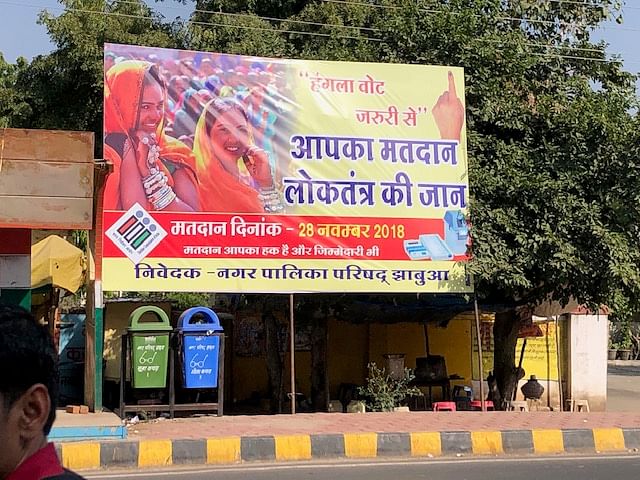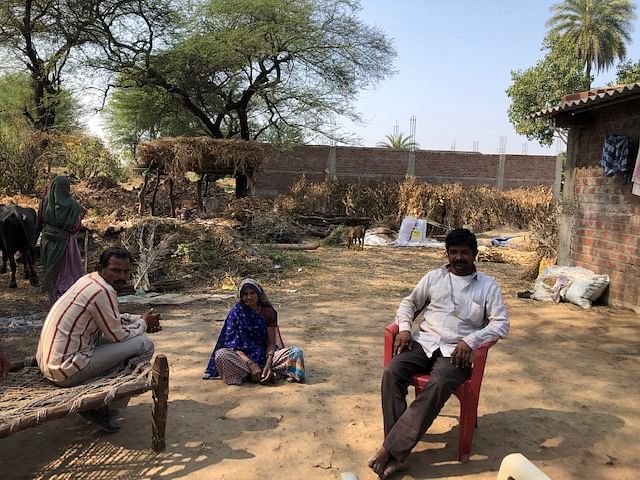Madhya Pradesh has the highest number of tribals in India – about 21.5% of state’s population – whose support can make or break BJP & Congress’ fortunes.
Jhabua: Kesar Singh Vaskela is browsing his phone as he waits for the bus that’ll take him to the weekly haat (market). Vaskela, from the village Mohudi Pada in Jhabua, studied up to class 10 in a local school, but was forced to drop out and earn a livelihood thereafter.
But a dismal lack of opportunities meant Vaskela had to look for greener pastures. He now lives in Ahmedabad in the neighbouring state of Gujarat for seven to eight months a year, and works as a mason.
Dressed in a blue shirt, which he proudly says he bought in Ahmedabad just before Diwali, Vaskela, 24, makes a string of complaints against the incumbent BJP dispensation in Madhya Pradesh: No water, bumpy kutcha (unmetalled) roads, poor quality schools, and most importantly, no means to earn a livelihood. “Badlaav lana padega, aur kya. Abhi jo hai sarkar mein, unse nahi hoga. (We need change. Those in power right now can’t do anything),” Vaskela says.
However, he adds that he still likes chief minister Shivraj Singh Chouhan, and that it isn’t the top leadership but the local administration and leaders who ensure nothing reaches tribal villages.
Vaskela is one of the around 1.6 crore tribal people in the state, but his story is indicative of the larger mood of the community.
The tribal vote in MP
The tribal vote is key to the fortunes of both the ruling BJP and the Congress, as the community accounts for 21.5 per cent of the population. Madhya Pradesh has the highest number of tribals in the country, and any political party keen to stake claim to power needs a strong strategy to win them over.
As many as 47 seats are reserved for Scheduled Tribe candidates, in which the BJP did exceedingly well in 2013, winning around two-thirds.

In Jhabua district, tribals account for nearly 87 per cent of the population. It is often said that the party which wins this district goes on to win the state polls. In fact, former CM and senior Congress leader Digvijaya Singh had famously declared on counting day in 2003 – when he was the incumbent chief minister – that since the Congress was not winning in Jhabua, it would lose the elections overall.
The tribal vote, therefore, isn’t one either of the two parties is willing to leave to chance. Congress president Rahul Gandhi visited Jhabua at the end of last month, while Prime Minister Narendra Modi is scheduled to address a rally here on 20 November.
However, 15 years of incumbency and the continued backwardness of tribals compared to other communities has meant the BJP has a problem on its hands.
Also read: Tracing Lord Ram’s steps & wheels for girls – comparing BJP & Congress manifestos in MP
Complaints galore
The tribal community is well aware of its electoral importance, and this is perhaps why it feels short-changed.
Vaskela’s concerns about the lack of development of tribal villages aren’t restricted to him. Lack of livelihood opportunities is a common refrain across Jhabua, which ensures that nearly 60-70 per cent of the working population migrates to Gujarat or Rajasthan at some point of the year to earn their bread and butter.
“Gaon mein kaam nahi hai, aur kaam hua bhi nahi hai, toh sarkar badalni chahiye (There are no jobs in the village, and no work has also been done, so the government should change),” says Tol Singh Damor of Limkhodara village. “We have no roads inside villages, no proper schools, water is scarce, and some of us have not received houses under the Pradhan Mantri Awas (housing)Yojana.”
While most villagers say that the Ujjwala scheme for LPG cylinders and the PMAY have reached them, and that the electricity situation is better than under the Congress regime earlier, their living conditions remain below par.
“Last time I supported BJP, but we need to think now. Nothing has reached us,” says Kishan Jhaniya of Lakhpura village. Jhaniya also migrates to Jamnagar in Gujarat to work as a mason for most part of the year. He returned home for Diwali and intends to stay on until a little after polling day on 28 November.
Most tribals agree with Vaskela that it isn’t CM Chouhan who is at fault, but local leaders and authorities. This means a quandary for the BJP, since the CM is popular but the administration isn’t.
Not everyone, however, is as disillusioned.
“While it is true we have no jobs and poor infrastructure, we can’t blame the BJP government. Congress did nothing when in power. How can we trust them again? Let us continue with this regime and see what happens,” says Bhanwar Singh Damor of Bawadi, who finds support in several people gathered around him at the local mandi.
However, most voters from the tribal areas are reluctant to overtly indicate their political preferences. They talk in hushed tones and remain ambiguous about the elections. This, they explain in private, is because of the strong hold of sarpanchs (village heads) with political affiliations, and the fear of antagonising them.
Parties are now attempting to breach this barrier.
Also read: Madhya Pradesh Congress proposes to do away with UPA’s no-detention policy
Electoral strategy
For the Congress, the strategy is straightforward – attacking the 15 years of BJP rule. Congress workers and local leaders are travelling across the tribal belt, talking about how the BJP government has failed on several counts. ‘Waqt hai badlav ka‘ – one of its campaign slogans – is being widely communicated.
However, Congress lacks the BJP’s biggest advantage – an organisation pyramid and structure that percolates right down to the last voter, enabling deep access. The BJP has a zila adhyaksh (district president), followed by mandal presidents in both rural and urban areas. The mandal presidents are assisted by paalaks and sanyojaks – each of whom are responsible for a cluster of around 10 booths. The booth prabhari and sah-prabhari, in turn, are given a list of around 10-15 people whom they have to regularly be in touch with. The panna pramukhs – in charge of each page in the voters’ list – also have a big part to play.

This structure, attributed to party president Amit Shah, has proved useful elsewhere, but the party believes it is especially effective in tribal regions, to reach out to each voter.
The challenge for the BJP is not just to retain the tribal vote, but also to ensure they come out to vote – quite a task given the high level of migration and the absence of many voters on the day of polling. Its wide network is being used to ensure voters reach the polling booth.
The work of the Rashtriya Swayamsevak Sangh (RSS), through its affiliate – the Vanvasi Kalyan Parishad – is often seen as a key factor that helped snatch the tribal vote from the Congress, like in other states. The BJP hopes its well-oiled cadre machinery will maximise its reach among the tribals this time too.
The BJP is also trying to capitalise on Chouhan’s goodwill, encouraging the perception that local authorities are at fault for the tribals’ plight, and that corrections will be made if Chouhan is voted back.
As for the powerful sarpanchs, both parties are trying to use them as tools to influence voters.




Sachin Pilot has toiled for the last four years in Rajasthan, and the results show. Not sure how many tribals recognise Jyotiraditya Scindia, how extensively he travels outside his pocket borough. For that matter, Kamal Nath has represented Chhindwara, a tribal area, since before most Indians were born. The Congress no longer has powerful regional leaders. It also does not have much of a cadre, dedicated workers. There are things it must learn from the BJP. Otherwise it will have to wait patiently for three terms, as in Madhya Pradesh, for mounting anti incumbency to drop the apple on its head.